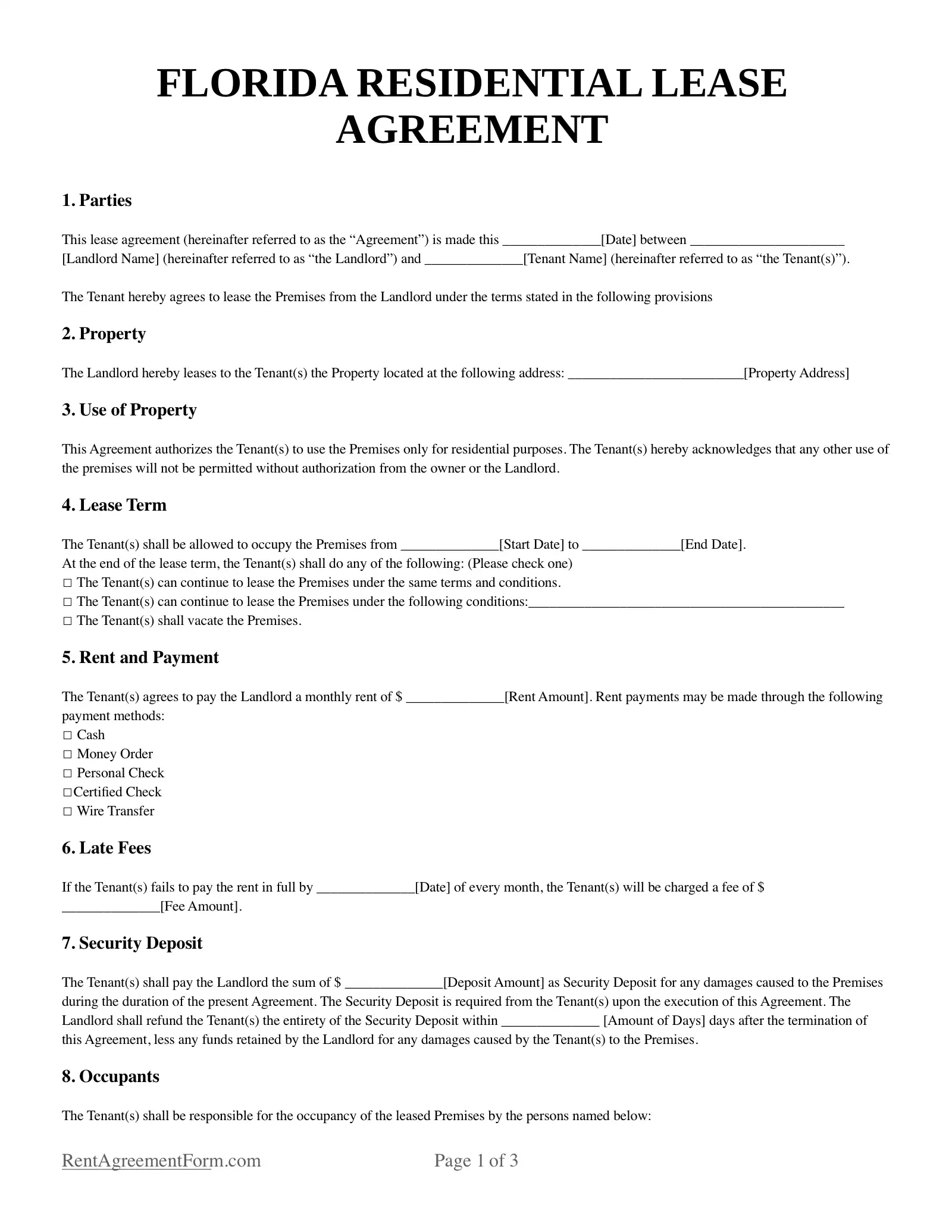Florida Residential Lease Agreement Form
A Florida residential lease agreement form is a legal document between a landlord and tenant(s) that establishes the conditions for the renting of a real estate property. The terms of lease agreements must be negotiated and discussed between the concerned parties before either sign it. Once the involved parties sign the agreement, it becomes legally binding.
The standard lease form in Florida is applicable for renting an apartment, mobile home, condo, or co-operative for a maximum term of one year.
The lease agreement comes into effect after the landlord screens the tenant through a rental application form. The Florida rental application provides the tenant's required details, including their employment details and rental history. It also gives their consent to run a credit report.
A lease agreement should not be confused with a rental agreement, as the latter applies to a short-term rental of real estate properties. Lease agreements, on the other hand, are long-term and come with pre-specified start and end dates.
The lease agreement form comes in a standard template that is fillable by the landlord and tenant. It includes personal identification details of the involved parties, number of occupants, rent details, amount, deadline, grace period and penalties, repair and maintenance responsibilities, pet policy, and other parameters.

Florida Rental Laws
The law in Florida mandates a lease agreement in oral or written form, preferably the latter in order to maintain documented records of the terms and conditions. The conditions established in the lease are bound by the Florida Landlord-Tenant Laws.
The law pertaining to landlords and tenants can be found in Chapter 83 of the Florida Statutes.
Required Disclosures
Florida law requires some disclosures to be made by landlords to tenants before the lease is signed, including:
- Disclosure of the landlord’s name and permanent address
- Disclosure of lead-based paint in houses built before 1978, with a state-approved pamphlet explaining its dangers to potential tenants
- Disclosure about the possibility of radon gas, disclosing any past cases of radon exceeding federal and/or state guidelines
- Disclosure of fire protection measures taken by the residential property if the building is over three stories high
- Disclosure of rules regarding the security deposit, including amount, refunds, deductions, and more including the location and the type of account (interest or non-interest bearing) where the money is being kept
Landlord's Access
The law in Florida requires landlords to provide tenants with reasonable notice before entering the premises, which is described in the statutes as at least 12 hours. The time of entering the dwelling is also limited to between the hours of 7:30 a.m. and 8:00 p.m.
The landlord may enter the premises under the following conditions:
- With the tenant’s consent (and reasonable notice)
- In case of an emergency
- If the tenant withholds consent on unreasonable grounds
- If the tenant remains absent from the property for a period equal to one-half the time for rental payments
Abusing the right to access to harass or exploit the tenant is strictly against the law in Florida. (Florida Statutes Title VI, 83.53 (2019))
Rent Grace Period
The law in Florida does not require landlords to have a grace period for paying rent. Rent is normally due at the beginning of each rental period. After that, unpaid rent will be considered a late payment and may be subject to a late fee.
The inclusion of a rent grace period depends on the wishes of the landlord and the details must be included in the lease agreement. In most cases, the standard grace period in Florida will be three to seven days.
Security Deposits: Maximum and Return
The law in Florida does not specify a limit on how much security deposit a landlord may request.
In case there are no deductions on the security deposit, the landlord is expected to return the tenant’s money in 15 days. In case of any deductions, this period is extended to thirty days. The tenant can seek legal intervention in case the security deposit is not returned within the stipulated time period (Florida Statutes Title VI, 83.49 (2019)).
Helpful Resources
For more details on leasing residential properties in Florida, you can refer to the following resources to guide you: